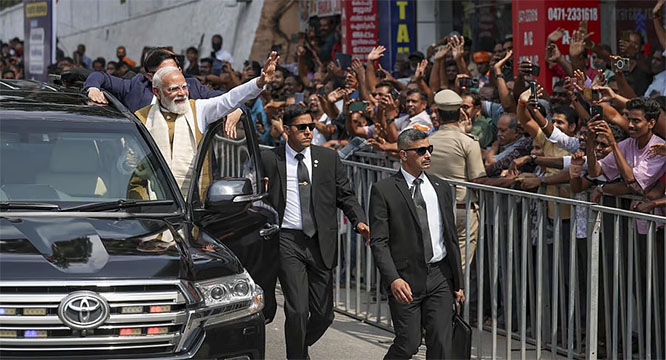India has told the UN Security Council that the humanitarian crisis, exacerbated by the Covid-19 pandemic, calls for relaxation of sanctions imposed on Syria, saying the international community must act with a “sense of urgency” to help the Syrian people.
India's Permanent Representative to the UN Ambassador T S Tirumurti said this on Monday while addressing the Security Council briefing on Syria.
“The 10-year long Syrian conflict has brought untold suffering to the Syrian people. The Covid-19 pandemic has further compounded the situation, posing serious challenges to the fragile health infrastructure. There is an urgent need to increase humanitarian assistance to all Syrians throughout the country without discrimination, politicisation, and any preconditions,” Tirumurti said.
He emphasised that the humanitarian crisis, exacerbated by the pandemic, “calls for relaxation of sanctions imposed on Syria. The international community must act with a sense of urgency to help the Syrian people.”
He voiced conviction that all efforts towards improving the humanitarian situation in Syria will positively impact the political track as well and called upon the wider UN system, in particular the World Health Organization and the United Nations Office for the Coordination of Humanitarian Affairs, to prioritise the vaccination programme in Syria, including through the COVAX initiative.
Tirumurti described it as “disheartening” that the conflict in Syria marks 10 years, peace and stability, unfortunately, remain elusive to the country and its people.
The political transition in Syria facilitated by the UN is not the only process presently underway and the five rounds of meetings of the drafting body of the Syrian constitutional committee have resulted in very little progress. “External influence is also adversely impacting the process,” he said.
“The situation on the ground does not present an optimistic picture either. It will be unrealistic to expect any dramatic outcomes in the near future, unless the international community takes decisive collective steps in the right direction,” he said, adding that if there is seriousness about achieving progress, there is need to have greater convergence of views and act to strengthen the hands of the Special Envoy Geir Pedersen.
Constructive international diplomacy is the need of the hour to bridge existing divides by focusing on mutual and reciprocal steps, he said.
In late December last year, UN human rights expert Alena Douhan had called on the US to remove unilateral sanctions against Syria, saying the sanctions imposed under the Caesar Act may “exacerbate the already dire humanitarian situation in Syria, especially in the course of Covid-19 pandemic, and put the Syrian people at even greater risk of human rights violations.”
The Caesar Syria Civilian Protection Act, also known as the Caesar Act, contains the most wide-ranging US sanctions ever applied against Syria, a UN Human Rights statement had said.
It added that the broad sweep of the US sanctions law that went into effect in June last year could target any foreigner helping in reconstruction of the conflict-ridden country, and even employees of foreign companies and humanitarian operators helping rebuild Syria.
In remarks to the press following the briefing to the Council, Pedersen said the Syrian conflict has now lasted for the same period as the First World War and the Second World War and the Syrian people must feel that they are really trapped in an endless conflict.
While there is a way forward, there is a need to find a way around the “you first” syndrome that has dominated much of the diplomacy around Syria for the last decade, he said.
“Right now, there are what I call ‘demands on all sides’ – but little movement on any side. And this dynamic has to change,” Pedersen said, adding that what is needed at the moment is to identify with realism and precision and implement in parallel mutual and reciprocal steps from Syrian and international players.
“All players – including the Syrian government and opposition, and key international players – would need to be ready to identify not only what they realistically hope to achieve, but what they can put on the table,” he said.
Tirumurti reiterated that delinking humanitarian and developmental work with progress on the political track will help in creating a conducive environment of trust and confidence.
He further noted that the Syrian conflict and involvement of external actors has contributed to the growth of terrorism in Syria and in its neighbouring countries, an issue that has been reiterated in the latest report of the Secretary-General on the threat posed by ISIL.
“We express our serious concern with the increased presence and terrorist activity of ‘Hayat Tahrir al-Sham’ and other affiliated terrorist groups that pose a threat to civilians inside and outside the Idlib de-escalation area,” he said.
“India firmly believes that long-term security and stability in this region can only be achieved by preserving the sovereignty and territorial integrity of Syria. We also remain convinced that there can be no military solution to the Syrian conflict and reaffirm our commitment to advancing a Syrian-led and Syrian-owned UN-facilitated political process” in line with relevant UNSC resolution.
India has extended developmental assistance and human resource development support to Syria regularly, including lines of credits for developmental projects and supply of medicine and food.







Comments
Add new comment